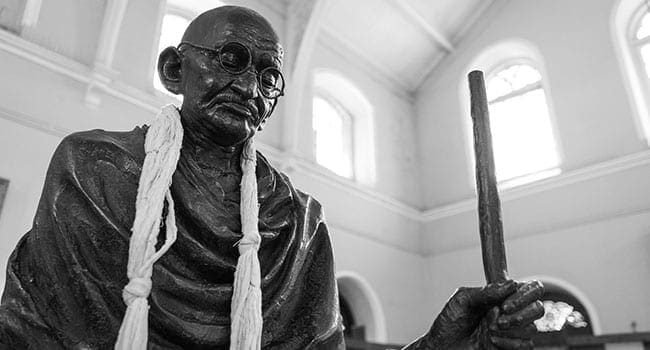 In 1849, American philosopher Henry David Thoreau was angry at his government’s actions in the Mexican-American War and at the continued legality of slavery in the United States. He published an essay entitled Civil Disobedience, in which he stated that that the evils of war and slavery should be confronted by citizens through withholding their taxes.
In 1849, American philosopher Henry David Thoreau was angry at his government’s actions in the Mexican-American War and at the continued legality of slavery in the United States. He published an essay entitled Civil Disobedience, in which he stated that that the evils of war and slavery should be confronted by citizens through withholding their taxes.
Though such law-breaking, he thought, was justified, he believed that those who disobeyed the government, even an unjust government, should be prepared to face legal retribution.
Thoreau was imprisoned for refusing to pay the poll tax.
Others imitated this example.
In India, Mahatma Gandhi led a drive for independence from the rule of the British Empire using Thoreau’s principles. In 1920, Gandhi launched the Non-Co-operation Movement, calling for a boycott of all government activities and a burning of British-made clothing whose import had harmed Indian textile workers. The great Salt March of 1930 was a massive demonstration in protest of the tax on salt.
Over the years, Gandhi led repeated strikes, demonstrations and marches in order to show that his country was ungovernable without the consent of its people.
For these acts of disobedience, he was imprisoned a number of times – a penalty he never sought to evade. From his career of resistance came the principle that those who break the law must suffer its prescribed punishment. Hundreds of thousands of Indians were imprisoned by the British until finally India won its independence in 1947.
In America, Baptist minister Martin Luther King Jr. chose to protest racial segregation laws and the oppression of African Americans through campaigns that resembled those of Gandhi. In Montgomery, Ala., he supported a boycott of the transit system that made blacks sit at the back of buses; in Selma, Ala., he violated the law that forbade marches without city approval; in Atlanta, he joined a sit-in protesting segregated dining rooms.pipe
King was arrested numerous times but he insisted disobedience always came with a price, saying: “Any man who breaks a law that conscience tells him is unjust and willingly accepts the penalty by staying in jail to arouse the conscience of the community on the injustice of the law is at that moment expressing the very highest respect for the law.”
Readers may think that this principle has not applied in recent confrontations over the extension of a British Columbia pipeline.
The unspoken contract of civil disobedience is this: you break the law in order to highlight some injustice, and then you serve the penalty. By doing this you show the seriousness of your purpose and your willingness to suffer for your beliefs.
If you inconvenience or endanger your fellow citizens, if you withhold revenue from the government, if you restrict the commerce of businesses – in short, if you violate social harmony on behalf of an alleged greater good, you are not permitted to walk away from your actions unpunished.
The law remains the law until it is changed and no group is allowed to place its virtue above the norms – the law – we have agreed to live by.
Protest non-violently all you want, make your neighbours suffer for your cause if you think it will do some good, but a well-regulated society must restore the balance you have upset by exacting its due price for your actions.
However, this social harmony also demands a government acts firmly against those who break the law.
There is, of course, justified resentment among law-abiding citizens when they perceive that their rulers are reluctant to enforce legal norms.
When Canadians can’t travel to their destinations by road; when blockades disrupt rail traffic, shutting down businesses, and delaying the delivery of food, medicine, and other goods; when one group seems to be immune to the penalties that anyone else would expect to be levied against them, then disrespect for the law itself grows and social divisions are exacerbated to the detriment of our democracy.
Gerry Bowler is a Canadian historian and a senior fellow with the Frontier Centre for Public Policy.
Gerry is a Troy Media contributor. Why aren’t you?
The views, opinions and positions expressed by columnists and contributors are the author’s alone. They do not inherently or expressly reflect the views, opinions and/or positions of our publication.


